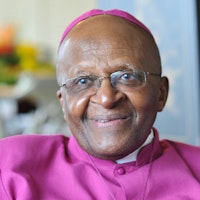God waits for God’s partners – we! And God has a dream: God has a dream of a world that’s different, a world in which you and I care for one another, because we belong in one family…. God says, can you help me realize my dream?
Desmond Tutu

God Has a Dream
Topic: Serving Others
“God waits for God’s partners – we! And God has a dream: God has a dream of a world that’s different, a world in which you and I care for one another, because we belong in one family.
And I want to make an appeal on behalf of God. God says, can you help me realize my dream – my dream of a world that is more caring, a world that is more compassionate, a world that says people matter more than things, people matter more than profit. That’s my dream, says God. Will you please help me realize my dream? And I have nobody except you.”
Desmond Mpilo Tutu (7 October 1931 – 26 December 2021) was a distinguished South African Anglican Archbishop and theologian known globally for his dedicated work as an anti-apartheid and human rights activist. His involvement in the fight against racial segregation in South Africa during the apartheid era was steadfast and resulted in significant contributions to the nation's quest for racial equality. In recognition of his efforts, Tutu was awarded the Nobel Peace Prize in 1984. His leadership and moral courage were instrumental in transitioning South Africa towards a more reconciled society.
Tutu was deeply religious and his belief in God, perceived as both a Heavenly Father and Heavenly Mother, played a major role in his life and advocacy. This belief, which extended beyond traditional Anglican theology, played a significant role in his stance on gender equality. His faith, therefore, wasn't simply a personal doctrine, but it also guided his public advocacy and influenced his approach towards human rights.
Tutu was also a strong proponent of Ubuntu, an African philosophy that stresses the interconnectedness of humanity. This concept aligns with the idea that one's well-being is tied to the well-being of others. Tutu's acknowledgment of advancements in human rights and his continued efforts for improvement were reflective of this philosophy. Despite the challenges he faced during the apartheid era, Tutu remained committed to advocating for a world where peace, justice, and dignity were accessible to everyone. Through his lifetime, Desmond Tutu left an enduring mark on society, and his legacy continues to inspire those who pursue equality and human rights.
Cobban, Helena. The Moral Architecture of World Peace: Nobel Laureates Discuss Our Global Future. University Press of Virginia, 2000. P. 123.

Desmond Tutu
Resources
Copyright © 2017 – 2024 LuminaryQuotes.com About Us

Archbishop Desmond Mpilo Tutu
Archbishop Desmond Mpilo Tutu, former head of the Anglican church in South Africa, recently retired as chair of his country’s Truth and Reconciliation Commission.
Additional Desmond Tutu Quotes
“Dear Child of God, I write these words because we all experience sadness, we all come at times to despair, and we all lose hope that the suffering in our lives and in the world will ever end. I want to share with you my faith and my understanding that this suffering can be transformed and redeemed. There is no such thing as a totally hopeless case. Our God is an expert at dealing with chaos, with brokenness, with all the worst that we can imagine. God created order out of disorder, cosmos out of chaos, and God can do so always, can do so now – in our personal lives and in our lives as nations, globally…. Indeed, God is transforming the world now–through us–because God loves us.”
–Desmond Tutu [God Has a Dream: A Vision of Hope for Our Time].
“Ubuntu is very difficult to render into a Western language. It speaks of the very essence of being human. When we want to give high praise to someone we say, “Yu, u nobuntu”; “Hey, so-and-so has ubuntu.” Then you are generous, you are hospitable, you are friendly and caring and compassionate. You share what you have. It is to say, “My humanity is caught up, is inextricably bound up, in yours.” We belong in a bundle of life. We say, “A person is a person through other persons.” It is not, “I think therefore I am.” It says rather: “I am human because I belong. I participate, I share.” A person with ubuntu is open and available to others, affirming of others, does not feel threatened that others are able and good, for he or she has a proper self-assurance that comes from knowing that he or she belongs in a greater whole and is diminished when others are humiliated or diminished, when others are tortured or oppressed, or treated as if they were less than who they are.”
–Desmond Tutu [No Future Without Forgiveness].